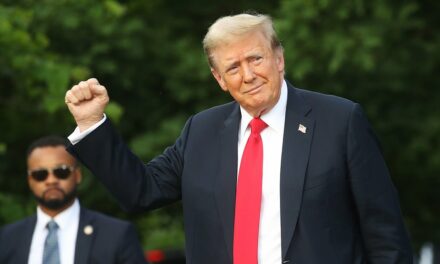We support our Publishers and Content Creators. You can view this story on their website by CLICKING HERE.
Earlier this month, after almost four years of the Biden-Harris administration’s weakness, Americans voted overwhelmingly for the return of former President Donald Trump’s determined leadership.
Nowhere is that leadership needed more than in the Middle East, where the aftershocks of Hamas’ Oct. 7, 2023, attack on Israel continue to reverberate—not only in the region but here at home.
Trump left office in 2021, having just sealed the first peace deals between Israel and Muslim-majority countries in 25 years. This success stemmed from a policy that combined unequivocal support for the Jewish state with consistent and constructive outreach to America’s Arab partners and allies.
The result was peace. After Iran significantly expanded its sponsorship of its terrorist proxies funded by the Obama-era nuclear deal, America’s deadliest regional foe was being crushed by the most aggressive unilateral economic sanctions regime in history.
Four years later, Trump is inheriting a Middle East on the brink of regional war. Israel is under sustained attack by Iran’s proxies Hezbollah, Hamas, and the Houthis—and for the first time, by Iran directly.
Iran’s malign interference has also created failed states from Lebanon and Syria to Iraq and Yemen. Meanwhile, Iran’s economy is strengthened by a 25-year, $400 billion agreement with China, its new patron.
Israel’s attempt to defend itself against these threats has been undermined by the timid and equivocal approach of the Biden-Harris administration. This White House has insisted on restraint and urged a negotiated ceasefire with the terrorist groups while threatening to withhold vital military resupply if Israel doesn’t prosecute the war as instructed.
But as President Ronald Reagan demonstrated in countering the Soviet Union’s aggression in the Middle East after the 1980 election, decisive and principled American leadership could reverse even a severe regional decline. That is what Americans are looking for—and what the world needs—from Trump.
But simply reimposing the successful policies of his first term, however much they might improve on the Biden-Harris record, will not be enough to correct the course. Reestablishing deterrence against Iran, bolstering Israel’s defenses, and getting back on track to even more significant regional peace deals will require a fresh approach.
The first problem Trump will have to confront is that the crisis in the Middle East is not staying there—it is also here in the United States. Immediately after the Oct. 7 attack, pro-Hamas and antisemitic riots started on American streets and campuses, revealing an entrenched hatred of Jews and Israel that will demand the new president’s attention.
By moving the State Department’s special envoy to monitor and combat antisemitism to the White House and giving this critical appointment a domestic as well as international remit, Trump could be the first president to address the issue holistically by having his senior official for antisemitism connected to both the National Security Council and the Domestic Policy Council staffs.

 Conservative
Conservative  Search
Search Trending
Trending Current News
Current News 





